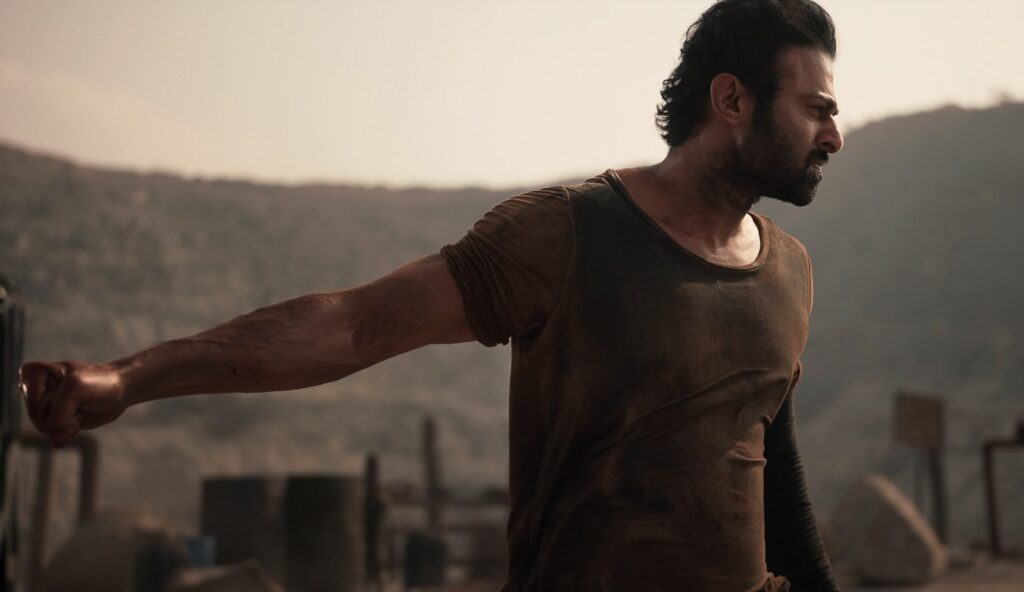Telugu Movie Review: Salaar: Part 1 – Ceasefire may only be half a story, but it still feels like the most massive epic of the year

It’s been a long time since I’ve felt as utterly exhausted by a film as I was by Salaar: Part 1 – Ceasefire, which crams what seems like multiple Greek tragedies worth of material into just under three hours. And yet, despite the sheer volume of characters and story involved in the movie, it’s still basically all just exposition laying the groundwork for Part 2, which is currently in production and aiming for a release next year. Not only that, but even after this amount of setup, there remain a great number of mysteries left to be unraveled in Part 2, including how a few key characters in Part 1 connect to the main story being told in the first place. The utter enormity of what is being attempted in this saga is daunting, though at this point, one would expect no less from writer/director Prashant Neel, the mastermind behind the K.G.F. films.
For as much of an endurance test as this mythology-heavy movie is, I don’t want to imply that it is in any way joyless or a slog. Neel and the cast do a very good job of getting the viewer invested right from the outset, so that there is no temptation to give up on the mysteries of the story before the answers are finally revealed. From the very first sequence, where we meet main characters Deva and Vardha as children in a rousing moment of public uproar that will have ramifications for the rest of their lives, I “bought in” due to the sheer intensity of emotion evoked. That intensity is largely maintained after we fast-forward a couple decades and meet Aadhya (Shruti Hassan), whose life ties into Deva and Vardha’s saga in enigmatic ways that land her in mortal danger upon returning to her family’s homeland of India.
Aadhya’s story intersects with that of an adult Deva (“Rebel Star” Prabhas), who has already been established as the hero of this saga as a child, with the royal-blooded Vardha dubbing him “Salaar” (a name that means “leader, chief, or commander”). Living as an outcast in a remote area of India with his mother (Easwari Rao), it’s immediately apparent that Deva will play a key role in protecting Aadhya’s life – and not simply because he’s played by the effortlessly magnetic and heroic-seeming Prabhas. Equally apparent is that this undertaking is going to serve as an epic, violent referendum on the past. As a child, Deva vowed to always protect Vardha, which, needless to say, has not resulted in an easy life given the conflicts surrounding Vardha’s royal family.
The film is set in the fictional city-empire of Khansaar, for which filmmaker Neel develops an intricate, compelling mythology dating back hundreds of years, with especially significant developments following the British Raj. At the center of this is Vardha’s family. Vardha’s father Raja Mannar (Jagapathi Babu), the King of Khansaar where the story picks up, seeks to line up Vardha (played as an adult by Prithviraj Sukumaran) as his successor. But, as one might expect, this end-goal is not without its challengers. Jumping liberally in time, the film deftly sets up a collision course between the various factions within Khansaar and Vardha’s family, as well as between Deva and Vardha themselves.
For as much exposition and story detail as this all involves, Salaar: Part 1 – Ceasefire has a lot more plot development than character development. Yes, it seeks to tell a very complicated story, but not necessarily by fleshing out all of these characters’ personal lives and internal motivations. Instead, Neel and his cast are much more concerned with the raw emotions behind every plot revelation, the brute-force experience of the fights for both the future of Khansaar and the hidden truths behind its past. Salaar is extremely visceral and primal in its emotion, in a way that many laymen often call “Shakespearean,” even while actual Shakespeare devotees usually view that as an uninformed characterization.
Much of the emotion is conveyed through physical violence, as well. Salaar: Part 1 – Ceasefire is a bloody, often disturbing movie, though it’s worth noting that there is a refreshing lack of gunplay relative to other types of violence for a film set largely in the current century. The movie is heavily reliant on the one-man-versus-thousands trope for its action sequences, but in the same way as Kill Bill or John Wick expertly navigate, the audience is so invested in the aura of the hero that we suspend our disbelief and enthusiastically cheer Deva on as he eviscerates men by the handful. While Sandeep Reddy Vanga’s Animal may have the single best sequence of this sort produced this year, I have to say: Deva using a spear to skewer eight or nine guys in one motion, turning them into the bloody version of a shrimp kabob, is probably the most original kill I’ve seen in a long time. It also somehow avoids being so campy that it breaks the emotional intensity of the moment; the film never feels like anything short of a gut-punch. And yet, somehow, the sequel will still almost certainly feature far more violent mayhem.
Prabhas takes very strongly to the title role. The star of the iconic Baahubali films, which rank among the highest grossing in Indian history, has fallen into a critical and commercial rut in the years since. Salaar is being positioned as his return to thriving stardom, and his performance (bolstered by the filmmaking choices supporting it) seizes the opportunity. Watching Salaar, you would think he’s the biggest movie star in the world right now; my opening-day audience certainly cheered him on with that level of enthusiasm. Prabhas knows exactly the right buttons to press to get the viewer invested in his hero’s journey and feel the emotion of his experience. There’s just something in the way he moves and plays to the camera; it’s intangible but has an unquestionable impact on our engagement in the protagonist. And there is a nice poetry to the way his character arc mirrors his career arc; this is certainly a rise-from-the-ashes saga.
For as much praise as I have for the movie, and for as substantial as it feels, it still comes off as being quite incomplete as a standalone film. Unlike the way, say, The Lord of the Rings: The Fellowship of the Ring feels like a full meal on its own even though it’s setting up a much larger story, Salaar: Part 1 – Ceasefire struck me as a lot of setup for relatively little payoff. Yes, the cliffhanger at the very end, leading us into Part 2, is pretty shocking and intriguing, but it doesn’t necessarily leave the viewer feeling satisfied per se. I left the movie with a certain empty sensation, as if I had only watched a really long trailer preparing me for the sequel. Part of this emptiness may stem from the aforementioned lack of development of the supporting characters and their inner experiences. I felt like I was introduced to a lot of players in the movie, but Deva was the only one whose emotional arc I actually understood. This may partly be by design, to preserve mysteries for the second film, but that seems like a bit of a cheat.
Alas, I’ll just have to sit here waiting for the full title and release date of Part 2 to be announced, hopefully soon. For as completely drained as Part 1 left me feeling, I’d be lying if I said I wouldn’t relish the opportunity to watch the next film tonight if I was offered it.

